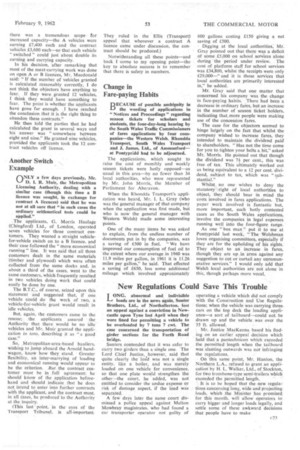Change in Fare-paying Habits
Page 55

If you've noticed an error in this article please click here to report it so we can fix it.
BECAUSE of possible ambiguity in the wording of applications in "Notices and Proceedings" regarding season tickets for scholars and students, the four-day-long hearing by the South Wales Traffic Commissioners of fares applications by four companies—the Western Welsh, Rhondda Transport, South Wales Transport and I. James, Ltd., of Ammanfordat Pontypridd had to be adjourned. The applications, which sought to
raise the cost of monthly and weekly season tickets were hotly opposed—as usual in this area—by no fewer than 34 local authorities, who were represented by Mr. John Morris, the Member of Parliament for Aberavon.
When the Rhondda Transport's application was heard, Mr. I. L. Gray (who was the general manager of that company when the application was first made, but who is now the general manager with Western Welsh) made some interesting points.
One of the many items he was asked to explain, from the endless number of documents put in by the companies, was a saving of £500 in fuel. "We have improved our consumption of fuel oil to the extent where our average in 1960 was 11.9 miles per gallon, in 1961 it is 11.26 miles per gallon," he said. That effected a saving of £650, less some additional mileage which involved approximately
800 gallons costing £150 giving a net saving of £500.
• Digging at the local authorities, Mr. Gray pointed out that there was a deficit of some 15,000 on school services alone during the period under review. The cost of platform staff for school services was 134,800, whilst the receipts were only £29,000—" and it is those services that local authorities are primarily interested in," he -added.
Mr. Gray said that one matter that concerned his company was the change in fare-paying habits. There had been a decrease in ordinary fares, but. an increase in the number of season ticket holders, indicating that, more people were making use of the concession fares.
The case for the objectors seemed to hinge largely on the fact that whilst the company wished to increase fares, they intended to maintain the dividend paid' to shareholders. "Has not the time come for you to. tighten your belts a bit," asked Mr. Morris. He pointed out that though the dividend was 7+ per cent., this was free of tax. This ultimately worked out as being equivalent to a 12 per cent. dividend, subject to tax, which was "substantial."
Whilst no one wishes to deny the statutory right of local authorities to object, they should bear in mind the costs involved in fares applications. The paper work involved is fantastic but, more important, such hotly contested cases as the South Wales applications, involve the companies in legal expenses running well into the four-figure range.
As one "bus man" put it to me at Pontypridd last week, "The Welshman loves organising committees, especially if they are for the upholding of his rights. They object to an increase in fares, though they are up in arms against any suggestion to cut or curtail any unremunerative services." I would only add that Welsh local authorities are not alone in this, though perhaps more vocal.
















































































































